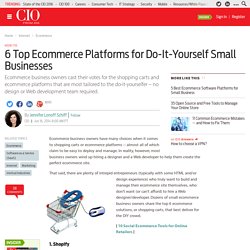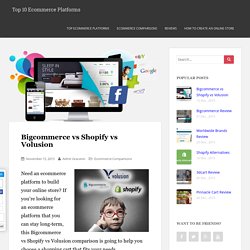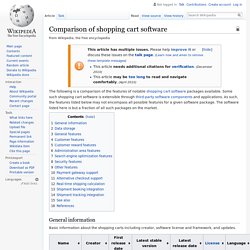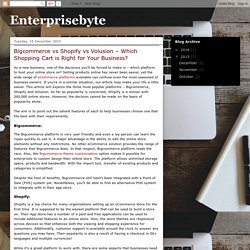

Bigcommerce or Shopify or Volusion - Which is the best shopping cart solution? Compare Ecommerce Platforms - Shopify VS Volusion VS Bigcommerce VS Magento VS Bigcartel. Ecommerce Platform Comparison. E-commerce Shopping Cart Comparison. 6 Top Ecommerce Platforms for Do-It-Yourself Small Businesses. Ecommerce business owners have many choices when it comes to shopping carts or ecommerce platforms -- almost all of which claim to be easy to deploy and manage.

In reality, however, most business owners wind up hiring a designer and a Web developer to help them create the perfect ecommerce site. That said, there are plenty of intrepid entrepreneurs (typically with some HTML and/or design experience) who truly want to build and manage their ecommerce site themselves, who don't want (or can't afford) to hire a Web designer/developer. Dozens of small ecommerce business owners share the top 6 ecommerce solutions, or shopping carts, that best deliver for the DIY crowd. [ 10 Social Ecommerce Tools for Online Retailers ] 1.
[Related: 5 Best Ecommerce Software Platforms for Small Business] "I [did] thorough research prior to launching my business six months ago, and [thought] Shopify was by far the best ecommerce platform for small businesses," she says. Basic plan: $29/month 2. 3. Bigcommerce vs Shopify vs Volusion - Which Is The Best? Need an ecommerce platform to build your online store?

If you’re looking for an ecommerce platform that you can stay long-term, this Bigcommerce vs Shopify vs Volusion comparison is going to help you choose a shopping cart that fits your needs. At first glance, the three platforms are very similar. The moment you dig deeper into configuring your online store, you will notice the major differences and what kind of user the cart was designed for. For example, Bigcommerce is ideal for an online store that needs advanced features and plenty of potential for growth. Shopify is the best for users looking for a quick and easy store configuration process and design. Which ecommerce platform is more popular? Bigcommerce, Shopify, and Volusion are the most popular hosted ecommerce platforms out on the market right now.
Shopify powers over 200,000 online stores and have helped their stores process over $12 billion in sales. Comparison of shopping cart software. The following is a comparison of the features of notable shopping cart software packages available.

Some such shopping cart software is extensible through third-party software components and applications. As such, the features listed below may not encompass all possible features for a given software package. The software listed here is but a fraction of all such packages on the market. General information Basic information about the shopping carts including creator, software license and framework, and updates.
Data storage Information about what data storage system can be used. General features Information about the features the shopping carts offer. Customer features Information about the features the shopping carts offer.[20] Customer reward features. Enterprisebyte: Bigcommerce vs Shopify vs Volusion – Which Shopping Cart is Right for Your Business? As a new business, one of the decisions you'll be forced to make is – which platform to host your online store on?

Selling products online has never been easier, yet the wide range of eCommerce platforms available can confuse even the most seasoned of business owners. If you're in a similar situation, our article may make your life a little easier. This article will explore the three most popular platforms – Bigcommerce, Shopify and Volusion. As far as popularity is concerned, Shopify is a winner with 200,000 online stores.
However, the decision cannot be made on the basis of popularity alone. The aim is to point out the salient features of each to help businesses choose one that fits best with their requirements. Bigcommerce: The Bigcommerce platform is very user friendly and even a lay person can learn the ropes quickly to use it. Despite the host of benefits, Bigcommerce still hasn't been integrated with a Point of Sale (POS) system yet.